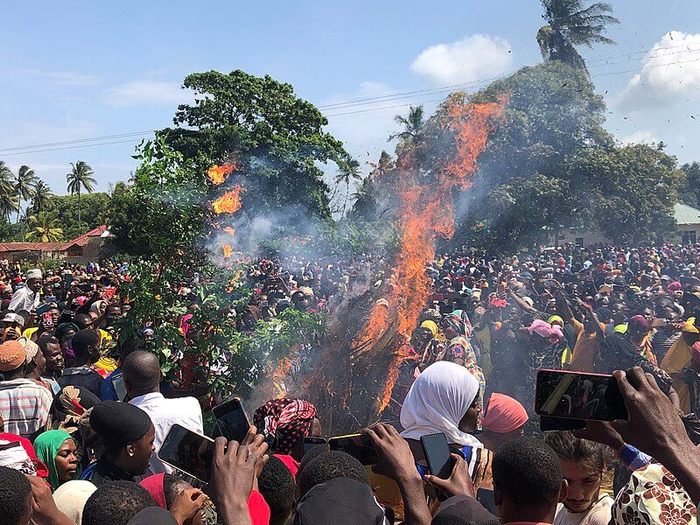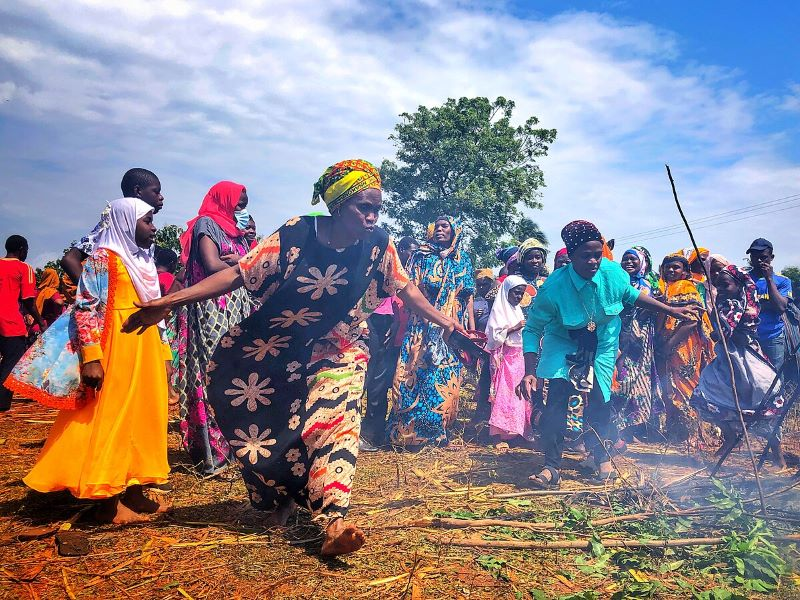Mwaka Kogwa Festival in Makunduchi, Tanzania. Source: Yamen, CC BY-SA 4.0, via Wikimedia Commons
Mwaka Kogwa Festival is a tradition dating back to the 19th century with historical ties to the traditional Shirazi or Persian New Year celebrations.
Mwaka Kogwa holds particular importance for deepening cultural legacies and strengthening community cohesion. Activities around the festival begin with traditional songs amongst the people, highlighting the values, beliefs, and history. There the journey to the prayer ground commences where a ceremonial sacrifice is conducted with a cow offered in thanksgiving.
Prayers and rituals for protection and good fortune for the new year are offered to the people before the festivities officially commence. The event then starts with a fun fight among the men of the villages. Each man, armed with banana sticks, commences a playful attack on each other in a nonviolent form with no attempt to cause hurt to each other. This activity symbolizes a channel through which ill feelings are exorcised, and goodwill is welcomed to begin the new year afresh.
Along with the mock fights, there are dancing, singing, and other forms of celebration. The women of the villages adorn themselves in the most colorful dresses and go about the community, singing cultural songs to celebrate family, joy, and happiness.
The traditional chief priest or healer then proceeds to foretell the community’s prosperity for the coming year by setting on fire a ritual hut built for this particular occasion and watching where the smoke is burning. The fire is seen as a symbol that ushers in a period of prosperity for the new year while consuming the challenges and pains of the previous year. The event culminates into a giant feast where guests are welcomed to participate.

Source: Yamen, CC BY-SA 4.0, via Wikimedia Commons
Traditional African festivals have always allowed communities to share a collective identity and bond. Bringing together people within the vicinity and abroad who converge for each celebration creates a deepened sense of unity and togetherness.
The Mwaka Kogwa festival exhibits such similarities. As a yearly activity, it attracts all sons and daughters to converge at the designated community grounds to celebrate a year filled with hopeful expectations.
Everyone actively participates in Preparations surrounding the event, irrespective of gender differences. From the traditional meals to the sourcing of the banana sticks and the clearing of the community grounds and decorations, there is a flurry of activities, with everybody lending a hand to ensure the festival’s success.
Prayers and rituals offered by the community are centered on the collective prosperity of all. Further deepening the bond is the collective feating, where everyone is free to receive, give, and welcome their neighbors to participate in whatever meal has been prepared. More so, the physical yet playful fight activity creates an avenue for dealing with grievances through peaceful conflict resolution.
This capacity to find common ground through the spiritual and physical aspects of the festival is among the many things that make the Mwaka Kogwa festival an excellent tool for creating social harmony and leading to a more prosperous society for Tanzania and an example for the world.

Okechukwu Nzeribe works with the Onitsha Chamber of Commerce, in Anambra State, Nigeria, loves unveiling the richness of African cultures. okechukwu.oniccima@gmail.com





